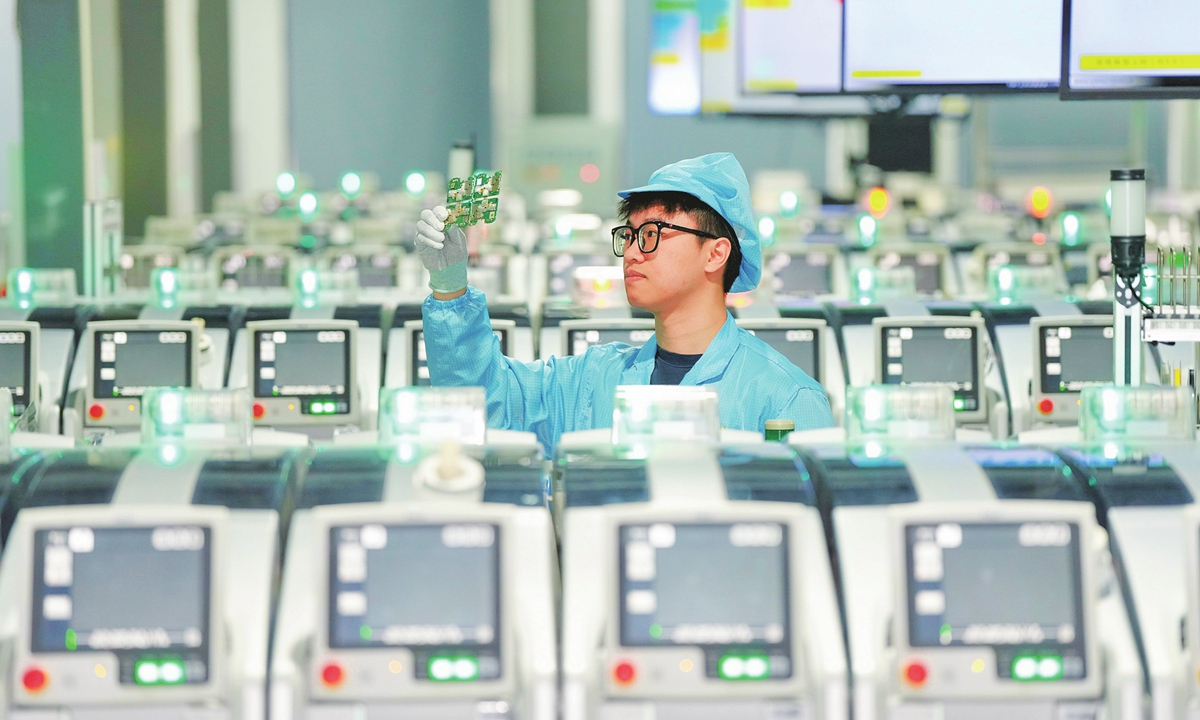
An employee inspects a cellphone chip at an electronic product research and development company in Ningbo, East China's Zhejiang Province on February 22, 2024. The company's products are exported to more than 80 countries in Europe and Latin America, and its overseas order book is full through the second quarter of 2024. Photo: VCG
Chinese experts on Saturday urged the US to stop its unreasonable crackdown targeting China's high-tech sectors represented by chips following Washington's reported plan to press the Netherlands next week to stop ASML from servicing some tools in China, as the ill-intended moves will only disrupt the global industrial and supply chains while backfiring on players in the US and its allies.
For instance, servicing is usually bundled in contracts with equipment during the sales process, and asking ASML to suspend servicing for tools already sold would harm the company's reputation, Xiang Ligang, director-general of the Beijing-based Information Consumption Alliance, told the Global Times on Saturday.
Xiang noted that the move itself- the US requiring a Dutch company to stop offering services for previously signed deals - is already unreasonable.
Alan Estevez, the US export policy chief, is scheduled to meet in the Netherlands next Monday with officials from the Dutch government and ASML to discuss the servicing contracts. The meeting is Washington's latest move to convince allies to join its efforts to further crack down on Beijing's ability to produce cutting-edge chips, Reuters reported on Thursday, citing two people familiar with the matter.
Washington may also be seeking to add to a list of Chinese chipmaking factories restricted from receiving Dutch equipment as part of the discussions, one of the people said, according to the Reuters report.
The reported move is in line with the general practice of the US - striving to enhance cooperation and not seek "decoupling" from China on one hand, while continuously carrying out suppression targeting Chinese high-tech sectors represented by chips on the other, Gao Lingyun, an expert at the Chinese Academy of Social Sciences, told the Global Times on Saturday.
In a recent call held between the two countries' top leaders, US President Joe Biden reiterated that the US does not want to curtail China's development, and does not seek "decoupling" from China, noting that its allies are not targeted against China, the Xinhua News Agency reported.
Both Xiang and Gao stressed that the non-stop US crackdowns with its allies targeting China's tech sectors would only disrupt industrial cooperation worldwide while involved enterprises may not be willing to comply with Washington's suppressive measures. The moves would only burden global consumers and companies with high costs and interrupt firms' normal operations.
Washington's suppression of Chinese chips has already backfired on its own companies, with exports of leading chip players in the US dropping, Xiang said, adding that the international landscape for the chip and related sectors would also shift.
China has long been a major market for US chip and equipment manufacturers as every involved party can benefit from the industrial chain, Xiang noted. He said that the US crackdown has pushed China to transform itself from just being a market to a manufacturer, which would affect the whole upstream chain involving enterprises from the US as well as the EU.
Restrictions on servicing ASML machines could be particularly painful, since the large and expensive tools require constant maintenance. China was ASML's second-largest market by sales last year with 29 percent of its sales, according to the Reuters report.
The Dutch government has also softened its tone on controls on exports of lithography machines by Dutch companies to China, as the Netherlands seeks to keep ASML in the country and expand cooperation with China, despite pressure from the US government to stymie China's technology rise.
"Dutch export controls do not target any country, and the decisions are made based on an independent assessment and in a safe and controllable manner to minimize the impact on global semiconductor industrial and supply chains,"
Dutch Minister for Foreign Trade and Development Cooperation Geoffrey van Leeuwen said during a meeting with Chinese Commerce Minister Wang Wentao in Beijing in March. In the latest move by the US in stepping up its crackdown on China's chips with the EU, the two sides committed to extending by three years their cooperation on identifying disruptions in the semiconductor sector, with a particular emphasis on mainstream "legacy" chips from China, according to a separate Reuters report on Friday.
US Commerce Secretary Gina Raimondo told a news conference that China was producing some 60 percent of legacy chips, found in cars, household appliances and medical devices, and would continue to do so in the coming years. "We know there's a massive subsidization of that industry on behalf of the Chinese government, which could lead to huge market distortion. That's why we're focused on it," she said.
The use of "market distortion" is questionable, and consumers and enterprises will actually benefit from China's ramped-up production capacity as it will lead to lower prices, Gao said. "This is not 'market distortion' but a more efficient means of production."




